












On August 7th, after a tense electoral process, the first leftist gov ernment took office in Colombia, led by President Gustavo Petro and Vice President Francia Márquez.
This administration which, during its campaign, promised a change in favor of life and living with flavor, without a doubt represents a source of hope for those Colombians who, as Francia Márquez called them in a paraphrase of Eduardo Galeano, are the nobodies
That thousands of people celebrated this historic event is evidence of the enthu siasm of the working classes and social movements for the possibility of change.
It will doubtless be impossible to accomplish everything in four years, but the foundation could be laid for a different Colombia, one that is more dedicated to life, peace, and human rights. This our hope as an international organization with a presence in Colombia.
The women’s organizations supported by FOKUS in Colombia are very hopeful for full compliance with the Peace Accord, especially its gender-based measures. They are also ready to back the creation of a National Action Plan through Res olution 1325, whose thematic lines are in keeping with the new realities of the country. It is no less important to resume talks with the ELN as a concrete step toward total peace.
The issue of the decriminalization of abortion through week 24, which received little support from the previous administration, is reborn in the hope that a com prehensive sexual and reproductive health public policy will be created.
Last but not least, the right to a life free of violence for women, young people, children, and LGBT persons; access to land for campesinos; as well as any number of other measures aimed at overcoming inequalities not only of gender but also of race, among others, are some of the demands of the women’s movement.
We thank our partner organizations in Colombia that have contributed to this magazine, each expressing their views of the challenges facing the new admin istration, with the hope that the historic change needed by Colombians in every corner of the country will come to fruition. FM
Contibutions to peacebuilding are based on resistance and strengthening the actions of young and mature women as pedagogy for protecting life and territory.
TEXT AND PHOTO: CENTRO DE PROMOCIÓN Y CULTURA-CPC
but also in the cities where the polit ical acts of women and young people is not to the liking of those who use the war as a way to organize, live, and increase their wealth, for actions for peace often conflict with the strate gies of these groups or individuals in the territories.

in the country, continues to represent a major challenge.
Following the arrival of the new administration, social and women’s or ganizations await the changes that these four years may bring. It is impossible to forget the systemic as sassination of social and environmental leaders and young people, the non-com pliance with the Peace Accord, and insti tutional violence. All this makes us think and reflect on the proposals of women in Colombia to transform all this pain caused by many years of war.
Positioning the proposals of social organizations has been and will con tinue to be a challenge, since the work in the territories continues to be stigmatized—with threats made against those doing the work—not just in the rural parts of Colombia
Preparing women for political par ticipation and advocacy is one of the challenges, since the objective is to prioritize the im plementation of the Peace Accord in the capital, and women’s abili ty to participate and create action plans is import ant not only for them but for all of society, since their proposals will support the changes that those who wish to build peace so long for. In this sense, we also believe that strength ening the alliance for the develop ment of a National Action Plan that has a feminist heart and vision, in order to implement Resolution 1325
One action that has been vital to this process is the facilitation of com munity programs, one of the axes of action that enables the training, po sitioning, and participation of women and young people; these spaces have shown how indespensible women are to the project of peacebuilding.
Positioning the proposals of social organizations has been and will continue to be a challenge.
Advancing the Working Class and Diverse Wom en’s Peace Agenda through these ac tions in Bogotá is important for so cial and women’s organizations, as peace is built through relation ships in these spaces. Likewise, it is im portant to prioritize proposals for a life free from violence, given how necessary it is for women’s rights to be respected in all contexts of the conflict.
We cannot deny the increase in vio lence against women and femicides;
we cannot allow acts wherein the pa triarchy attempts to continue coopt ing the political role and bodies of women, making women invisible and silencing the power they hold. Rec ognizing women’s bodies as the first territory for peace and politics opens the door to recognizing our battles and resignifying the processes that have been built.
We must think and ask ourselves how we want to build peace in this politi
cal context, how to continue forging ties of sorority, love, cooperation, and alliance among women, how, as women, we can continue empowering each other in every process, and how
the youth can begin to plant seeds that will call them together to work to create meaningful changes in such painful contexts as those we have had to experience in Colombia and which are reflected in the current context. In this sense, we must also think of how to contribute to the current moment, without letting our eyes be dazzled, without falling into naivete, and maintaining our current levels of autonomy and healthy criticism. This is also our time. FM

The bodies of women: the first territory for the experience of peacebuilding
This article addresses some of the challenges facing the current government in the areas of human rights and peace for transforming the lived realities of women and young people in the territories.

Today, Colombia faces a substantial challenge in the areas of human rights and peacebuild ing. After 200 years of being governed by the political and economic elite of the
country, hope has returned following the election of Gustavo Petro as President and Francia Márquez as Vice President on June 19, 2022. Without a doubt, these are historic results that stand on the shoulders of social organizations and alliances between political movements.

While it is a hopeful scenario, the chal lenges ahead will not be easy to over come, as the country’s political and economic powers continue to exert pressure to trip up the administration’s social agenda. For this reason, great ef forts will have to be made, from social inclusion policies to access to goods and services and even resuming peace negotiations, for the worsening armed conflict is exacting grave consequences in the territories.
If our work with women and young students in political advocacy and alternative media has shown us any thing, it is the need to create paths for building other life projects that go beyond offers of education for em ployment or of membership in armed groups and criminal networks present in the territories. This is the reality of the majority of young people living along Colombia’s periphery, such as residents of the Nupa of the Caunapí River Community Council in Tuma co, Nariño. With this group of young people, with whom we’ve been work ing for five years, we have identified the primary shortcomings in social transformation processes as a lack of opportunities, access to education, and legal work, and the fact of living in the midst of an active armed conflict.
Although this group of young people has been participating in commu nity activities and has consolidated themselves into a collective called PHYSIUMS, its members still lack real possibilities for accessing life projects that would enable them to strengthen their individual capabili ties and, in this way, deepen their or ganizational and collective processes.
This is a structural task and achieving it requires state policies that could begin to change these lived realities.
Another challenge that has become crucial in the midst of this political moment has to do with resuming peace processes in Colombia. The Final Accord for Ending the Conflict and Building a Stable and Lasting Peace represented progress for the country, however Iván Duque’s ad ministration acted on his pledge to “rip up the Peace Accord” and today
form a fundamental part of the polit ical agenda of this administration. It is likewise urgent that the abandoned peace talks with ELN be resumed in order to seek possibilities for peace for communities that today are direct victims of the armed conflict.
The country’s youth have a deepfelt need to demilitarize their lives and territories in order to create other ways of relating with one another and forming collectives. This is one of the primary obstacles facing the young people of La Nupa, who do not enjoy education al or employment opportu nities. Once they finish high school, their possibilities are few, which is why many turn to the economic out of joining armed groups or raising illegal crops. This re ality must be transformed in order to build more just and equal societies.
the consequences of this are serious: an Accord that has not been imple mented; which has not provided op portunities to reintegrated former guerrilla members; which has, in fact, persecuted them, leaving a balance of 326 signatories assassinated; an Accord that did not succeed in trans forming the war in the territories.
Today there are new armed struc tures present in Colombia, divided and distributed throughout the coun try: paramilitary organizations and drug-traffickers that take over entire territories, intimidating, massacring, and taking away opportunities to build a different country. Peace must
Without a doubt, art, culture, and com munication have opened the possibil ity of forming ties with communities and working with them on issues re lated to peace, the armed conflict, vi olence, gender, sexuality, and identity, generating transformative, proactive, and organizational dialogues. Today, with the winds of peace blowing in our favor, we have an opportunity to con tinue working to build a more peace ful, just, and equal society marked by social justice.
FM Reference www.cartografiasur.org/warmi-nayra/
After 200 years of being governed by the political and economic elite of the country, hope has returned following the June 19, 2022 election.
The challenges facing the new administration in Colombia in the area of women’s and LGBTIQ+ persons’ sexual and reproductive health (SRH) relate to services and guarantees, not to setbacks and advancement.

proposed agenda for its first year in of fice, controversy has also erupted over proposed changes to various depart ments, including healthcare, which has been named a priority for discussion and reform.
have filed seeking to force the Con stitutional Court to overturn Ruling C-055 decriminalizing abortion in all cases up till the twenty-fourth week of gestation.
On June 19, 2022, Colom bia elected an Afro-de scendent woman as the first Black woman Vice President of the repub lic, while at the same time electing Gustavo Petro Urrego as the first leftist politician to hold the office of the presidency. This election, which marks a precedent in the histo ry of the country, without a doubt has multiple impacts on social, political, economic, cultural, and environmen tal life in Colombia, for despite various positive aspects of the administration’s
Of course, health care reform will destabilize the system and re quires discus sions about sexual and reproductive health services, especially when considering how the outgoing ad ministration, in cluding the former president and vice president, have publicly opposed the recent legislative progress in sexual and reproductive rights. In a way, they have encouraged and supported the suits that individuals or institutions
Gains made in sexuality and rights must be respected during the transition toward a new healthcare model.
Among other things, the new admin istration faces a bleak public health outlook in sexual and repro ductive health, with high rates of gender-based violence, teen pregnancy, and maternal mortal ity, which reflect the worrisome effects of the COVID-19 pandemic on the priorities of the 2030 agenda with respect to women and LGBTIQ+ individuals; situations which merit special attention from the leftist and egalitarian government the Historic
Pact proports to be. These situations include at least three urgent issues:

1. Support for sexual and reproduc tive rights: This means continuing in line with legislative progress, which requires establishing regulations for the application of and compliance with Ruling C-055 of 2022. Likewise, it requires greater supervision of health institutions at every level, in both cities and rural areas, to ensure that they comply with procedures for the voluntary termination of pregnan cy (VTP) included in the maternal and prenatal Comprehensive Health Care Route (RIAS for its initials in Spanish), with special emphasis on the depart ments with excluded and impoverished populations, where the highest levels
of maternal mortality, childhood and adolescent pregnancy, and early and forced marriage are re ported.
2. Respecting gains in sexuality and rights during the transition toward a new health care model: Thanks to the battles waged by feminist organi zations and movements, people have certain guaranteed rights to SRH ser vices which must be safeguarded to ensure there are no roll backs in their coverage or availability. Advances must be made in strengthening a sexual and reproductive health public policy that increases: access to birth control; training for healthcare providers; and digital literacy and access to technolo gy and its tools so that people in rural areas are better able to make appoint ments and download their clinical his tories and authorizations. This policy must also include: rolling out compre hensive sexual education prioritized within educational curricula; develop ing a national healthcare system that
benefits women in different contexts; and implementing sexuality training programs that offer tools to help indi viduals make decisions autonomously and with self-care, sexual-emotional responsibility, and an enjoyment of physical pleasure, including in rural areas, where childhood and teen preg nancy has increased.
3. Promoting coordination among in stitutions, organizations, and individ uals with the Ministry of Equality, and overseeing the inclusion of and service for marginalized populations in human and sexual and reproductive rights. FM
The new administration must support the progress made in legislation by creating regulations to govern the application and oversight of Sentence C-055 of 2022.Young people in Pereira trained in dignified menstrual health.
The hope that many sectors of society have for the new government is proportional to the magnitude of the challenges it faces. FOKUS continues to push for change for social and gender justice now.

On August 7th, the ad ministration of Presi dent Gustavo Petro and Vice President Francia Márquez took office.
For the first time in the nation’s history, the formal ceremony in Bolívar Plaza was accompanied by cul tural and artistic events that took over the streets in the center of the capital. The citizens of the so-called “first gov ernment of the people” heeded the call to what turned into a day of celebration.
This time, it was not an event for the political elite, accessible to the gen eral public only through radio and television. The reinterpretation of the national anthem, the diversity of the artistic events, the centrality of the collective, and the diversity of the country and its margins reflected the ethics, aesthetic, and symbols of what is hoped to be a profound change in governance. This government was elected as part of a historic pact, that is, as a convergence of social and po litical forces, finally including social sectors that have never before been permitted to hold power.
These sectors of society were prom ised an administration that would govern with the people, for the com mon good.
But this promise frightens some, be cause the racism, machismo, and clas sism embodied in the sectors that have held power for more than 200 years has not disappeared; because armed,
to first respond to the media bubble; because the logics of power pervert.
How can expectations be grounded, recognizing the risks without re nouncing the historic opportunity that was celebrated in the streets? The answer comes from social or ganizations that have defended life and dignity in more hostile times and which embody Antonio Grams ci’s famous dictum, “with intellectual pessimism and willful optimism.” We have to work and work together.
social, and political divisiveness, with roots in a long history of inequality, cannot be resolved in four years; be cause there is no money, the country is in debt, and the global economy is in crisis; because it is not easy to con centrate on bringing about necessary transformations when the society of the spectacle forces elected officials
International civil society offers this administration significant backing, since upholding Petro’s campaign promise will bring us closer to the peace we dream of, the equality we work for, and the social justice that is long over due. It is support that does not renounce its autonomy, its capacity for criticism or its voice, and which contributes to administration’s process through its independent work, the lessons it has learned over its long his tory of supporting social organizations in the country, and the reflections it has made, which we offer today.
T1
Anti-racist feminism has taught us that, in order to address the root causes of
How can expectations be grounded, recognizing the risks without renouncing the historic opportunity that was celebrated in the streets?
social problems, it is necessary to un derstand their underlying systems of oppression and the ways these overlap. It is difficult to remove these consid erations from the context of social movements or academia to consider government policies but doing so will enable social movements to direct middle-term processes with econom ic, social, and cultural impacts that are truly transformational.
The agendas promoted by women’s and LGBT movements include the compre hensive implementation of the Peace Accord; the social appropriation of truth and justice processes headed by the Comprehensive System of Truth, Justice, Reparations, and Non-Repe
tition; the recognition, reduction, and redistribution of care work (which has historically fallen primarily on women) through the creation of a National Care System; and the defense of women’s autonomy over their bodies and lives through the adoption of a comprehen sive sexual and reproductive health policy. These are prioritized agendas which, with political will, government commitment, and a truly intersection al perspective, would bring us signifi cantly closer to a more just society, to becoming the world power for life for which social movements in Colombia have been fighting.
In this context, the conversation sur rounding the creation of the Ministry
of Equality takes on great importance and we join the call for this institution to be collective creation. For women and LGBT individuals, for example, it is important not to be read as being just another subgroup; they have been mak ing very important recommendations to strengthen the fruits and sharpen the teeth of this new government entity.
FOKUS, as an international civil so ciety organization with an office in Colombia, will continue working for a country and a world that are free of violence against women, where auton omy is respected, and that guarantees sexual and reproductive health; for a country where it is possible to enjoy real peace and security. FM

With the arrival of the first Colombian administration that recognizes itself as openly anti-patriarchal, with Francia Márquez Mina as Vice President, new questions and challenges arise for the feminist movement, a political force that was decisive in the presidential elections.

TEXT AND PHOTO: FONDO LUNARIA MUJER
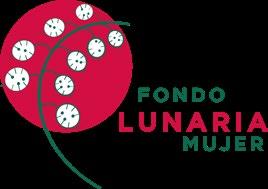
Anew landscape has opened up with the ar rival of Francia Márquez Mina and Gustavo Petro Urrego as Vice Presi dent and President of the Republic of Colombia. On August 7,
2022, the first progressive government in the history of the country was inau gurated, representing an indisputable victory for the social, ethnic, agrarian, feminist, and popular movement, a debt paid for the generations of victims of the armed conflict and with young
people that decided to put an end to the history that had turned its back on the Final Peace Accord.
A victory of these dimensions entails an infinity of challenges that come with such a first; yet this government will not be granted the benefit of a learn ing curve. On August 7 th, a four-year count-down began that brings with it the possibility of changing the conser vative and oligarchical inclination of the executive branch or, alternatively, of reverting to a progressivism that was not up to the task of governing. Femi nist women, in all our diversity, have an enormous task at hand.
The electoral campaign that culminat ed in the triumph of Márquez and Petro turned a spotlight on structural issues that have relegated the peripheral ter ritories to poverty and exclusion, some thing which the social movement has denounced on all fronts: structural rac ism, institutional misogyny, extractivist colonialism; in a word, the political and economic model of accumulation that for centuries has made a wealthy po litical class at the expense of labor and the lives of racialized, feminized, and jeopardized bodies. These issues and struggles have fed the discourses and organization of young feminist women: their impact been transversal across body and experience. Our agenda in cludes sustainable alternatives that can turn the situation around.
Francia Márquez Mina, our Vice Pres ident, realizes this. Her voice and life experiences, which have made great strides in advancing the representa tion of Black girls and women, is part of the body of the grassroots feminist fight that not only advocates for gen
der justice but also has a proposal for the country, one that is embodied in the Afro-Colombian slogan “live with flavor” and which is composed of an in tersectional understanding of the pre viously mentioned structural elements that have hindered the ability to live in harmony with our context, nature, and everyone around us.
The name of Márquez and Petro’s polit ical program, “Colombia, World Power for Life,” is a continuation of this slogan, as the title of its first section: “Change Is with Women.” Its proposals for wom en’s political participation, guarantees for our sexual and reproductive rights,
who developed these political propos als are called to lead their implemen tation on all fronts but we are also accustomed to others viewing feminist participation and agendas with dis trust, even in progressive circles. There, in the defense our non-negotiable, min imal rights, lies what is probably the greatest challenge we face as part of the social sector of this administration.
For decades, even centuries, we have strengthened our ability to respond to and defend against the violence of a new government that aims to make us disappear through tactics such as institutional persecution, stigmati zation of the opposition, a military apparatus that violates human rights, etc. But we are much less expe rienced in the political con trol of a power that appears to be aligned with us.
financial equality and independence, and the defense of a life free from vi olence, among other elements of the Program, are nothing but the recogni tion of decades of organizing by women and sexual dissidents throughout the country. The organizations of the Red Lunaria have raised these and other ini tiatives for a life with dignity and peace with social justice.
Yet the rise of not only these initia tives but also the security of many of the women who have fought for them and developed them from a position of opposition, carries the risk of demobi lizing the activist nature of the social movement. We know that those of us
We are not strangers to working to build this new country with individuals who, in the past and surely in the fu ture, have committed acts of violence against us. We know that machismo, racism, ableism, colonialism, and clas sism are structures that also reside in progressive circles but the journey has only just began and the hope gener ated by Márquez and Petro’s victory gives us confidence in others, in the will they have to recognize us from a place of care and transformation. Maybe this is the best contribution feminists can make to this new sce nario: we always believed in life, in forgiveness, in asking ourselves how we heal beyond punitive justice. And we are ready to continue doing this, now from a place of power.
The country’s first progressive presidency is an undeniable victory for the social, ethnic, agrarian, feminist, and working-class movement.

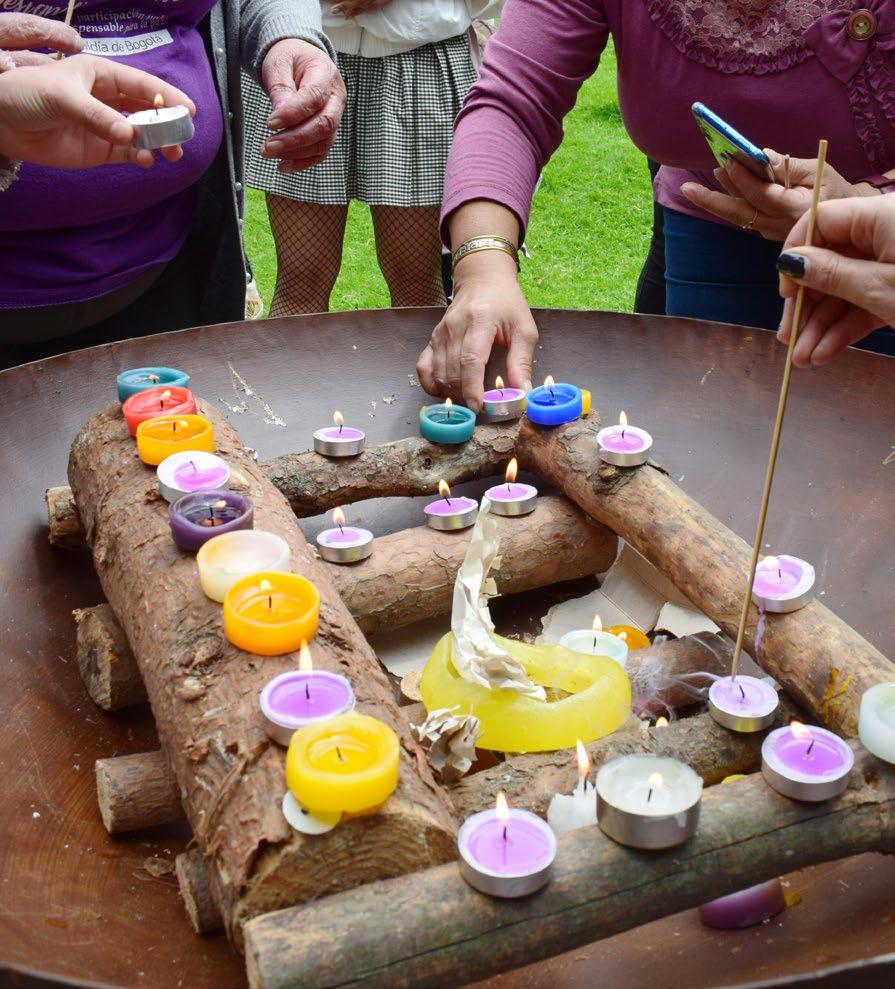
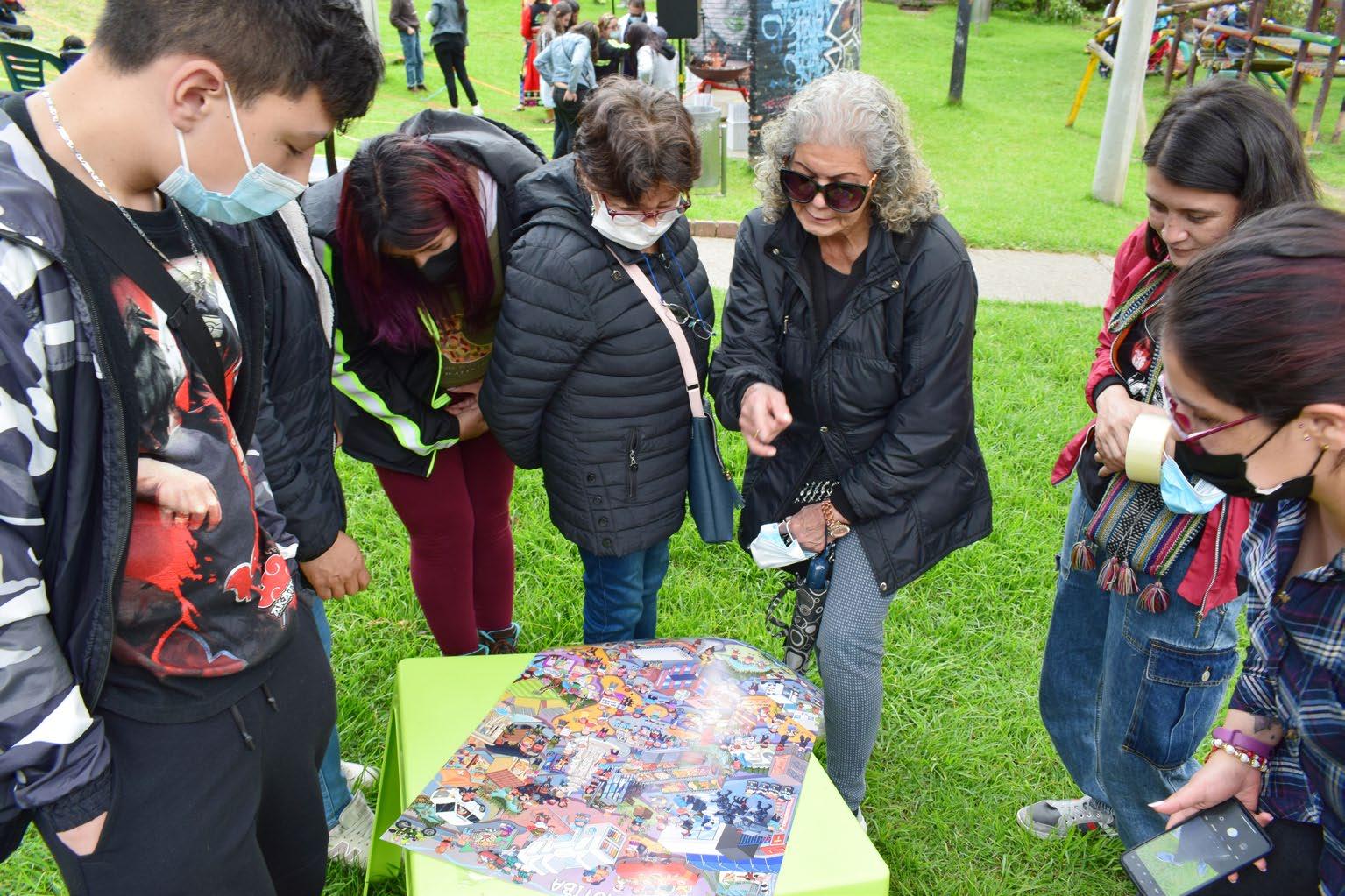
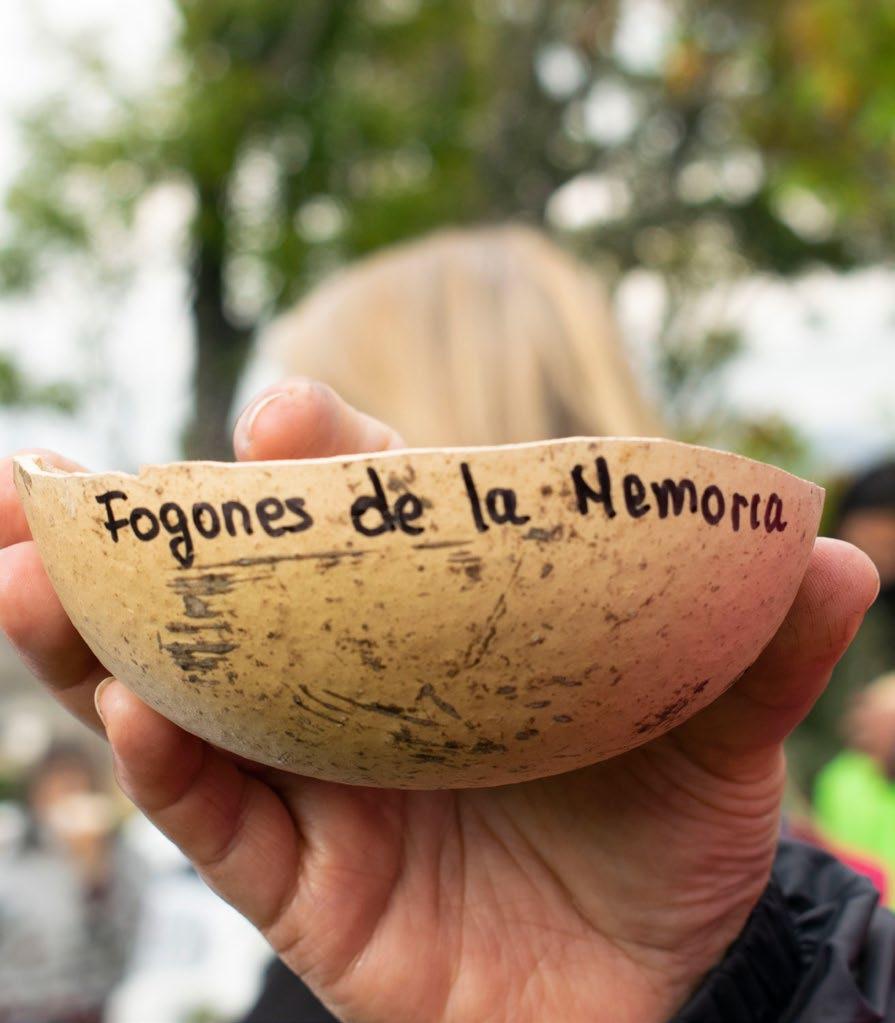
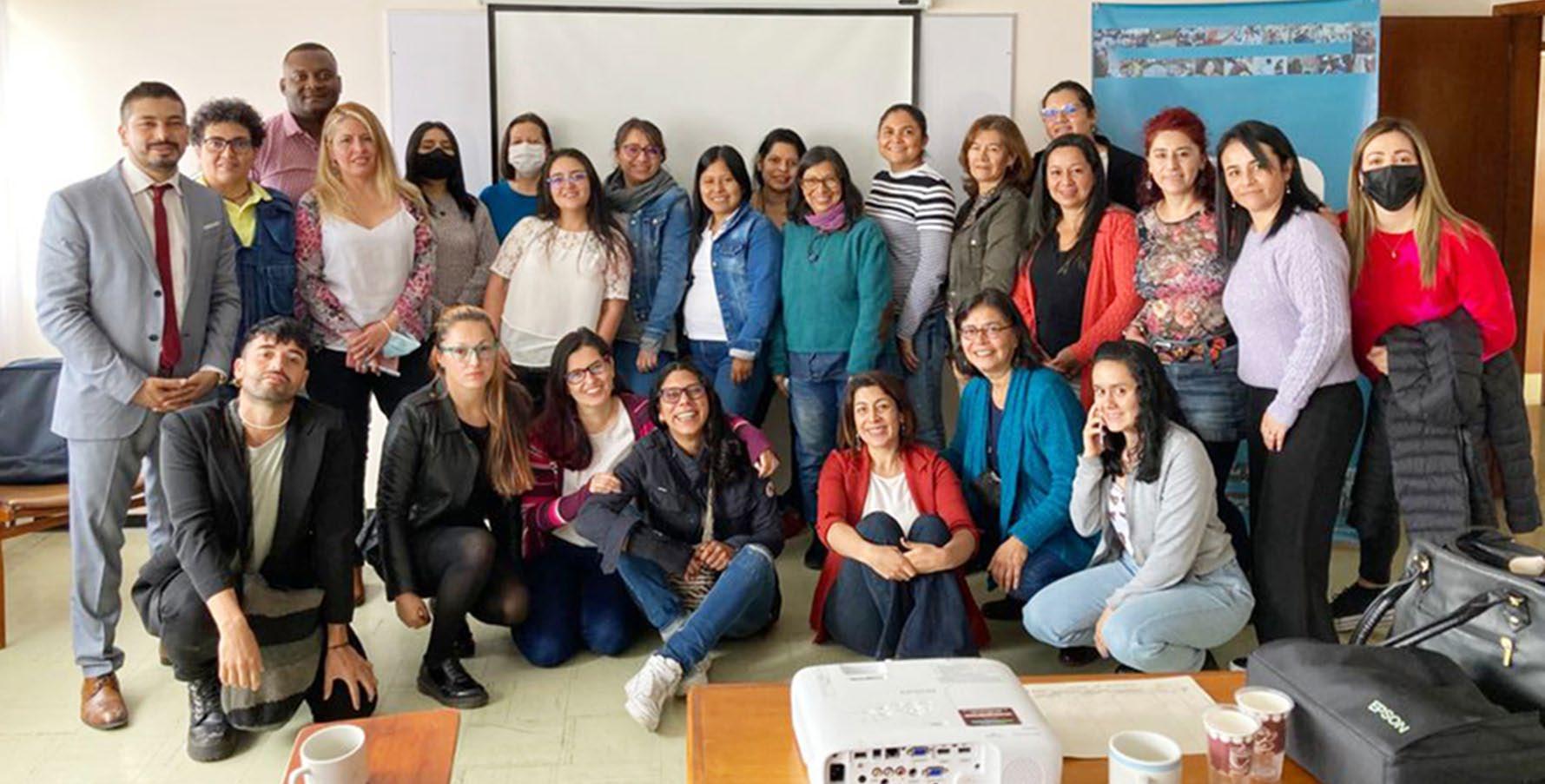
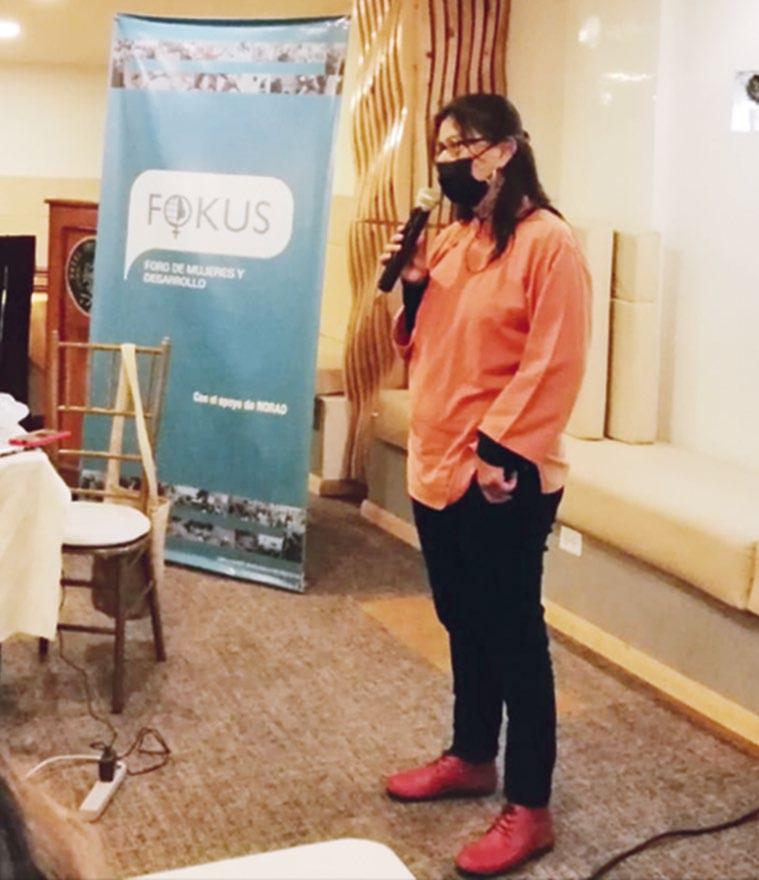
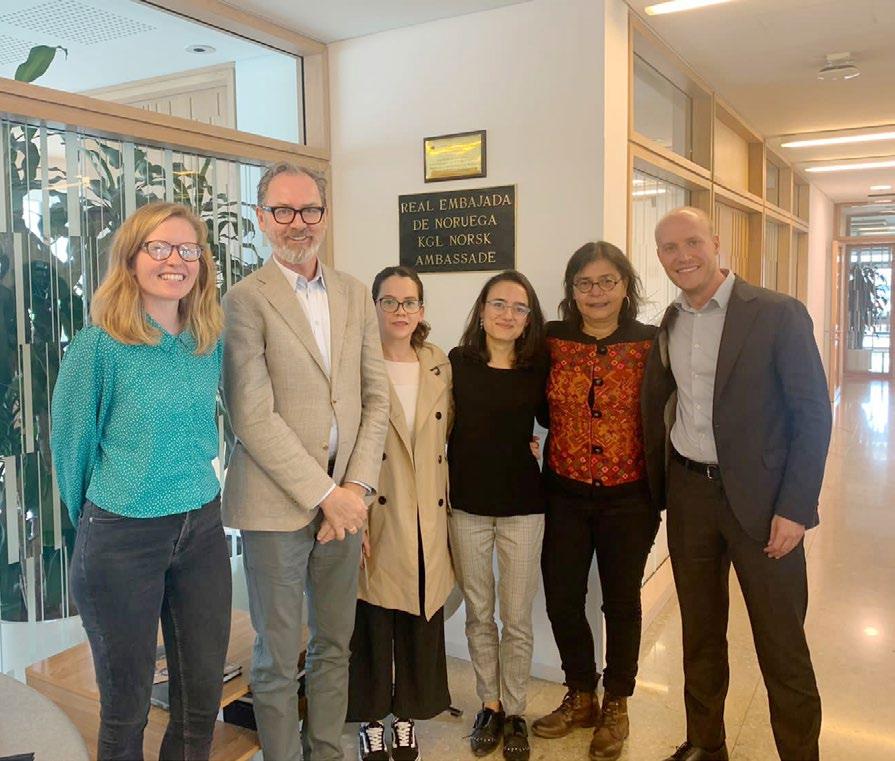
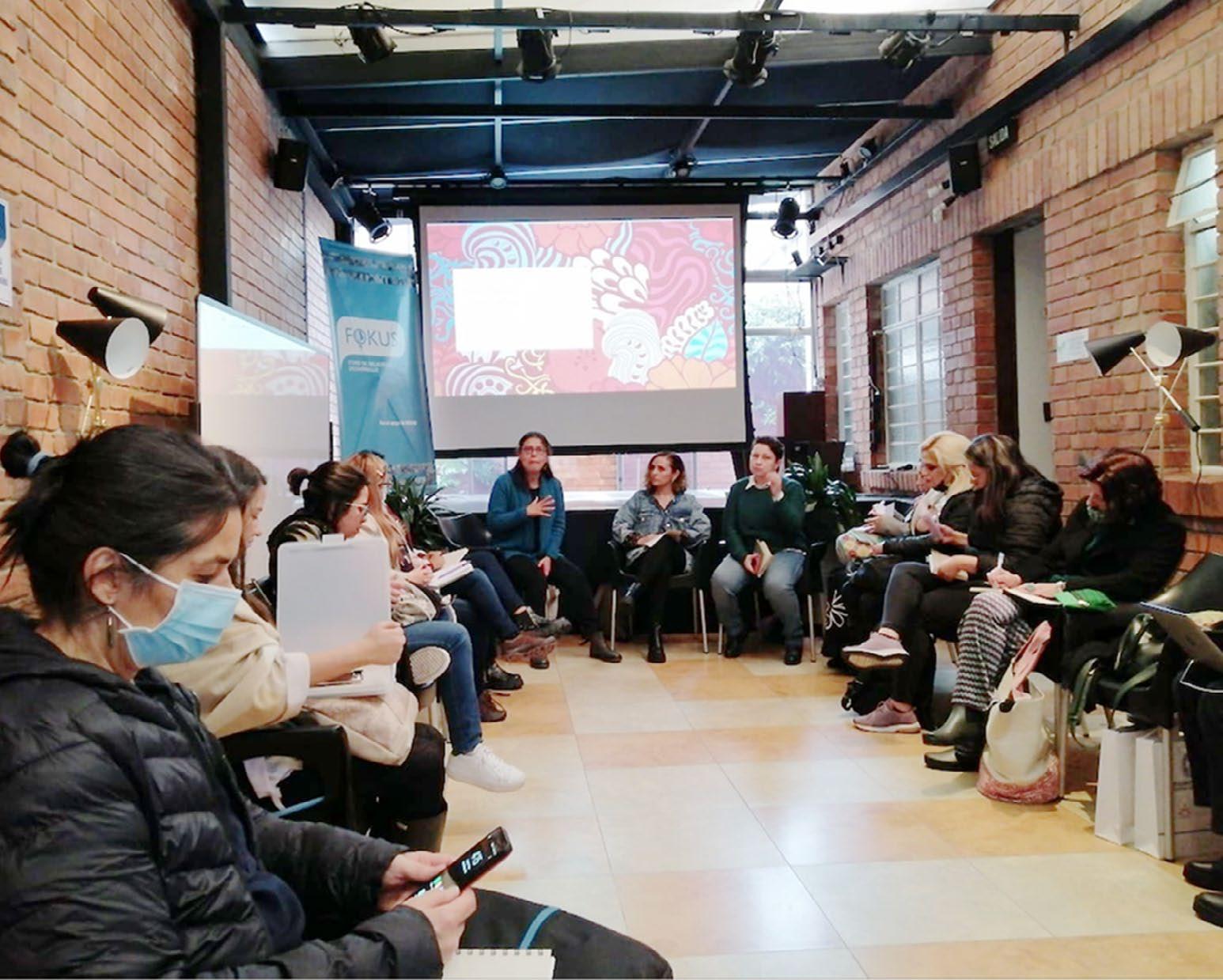
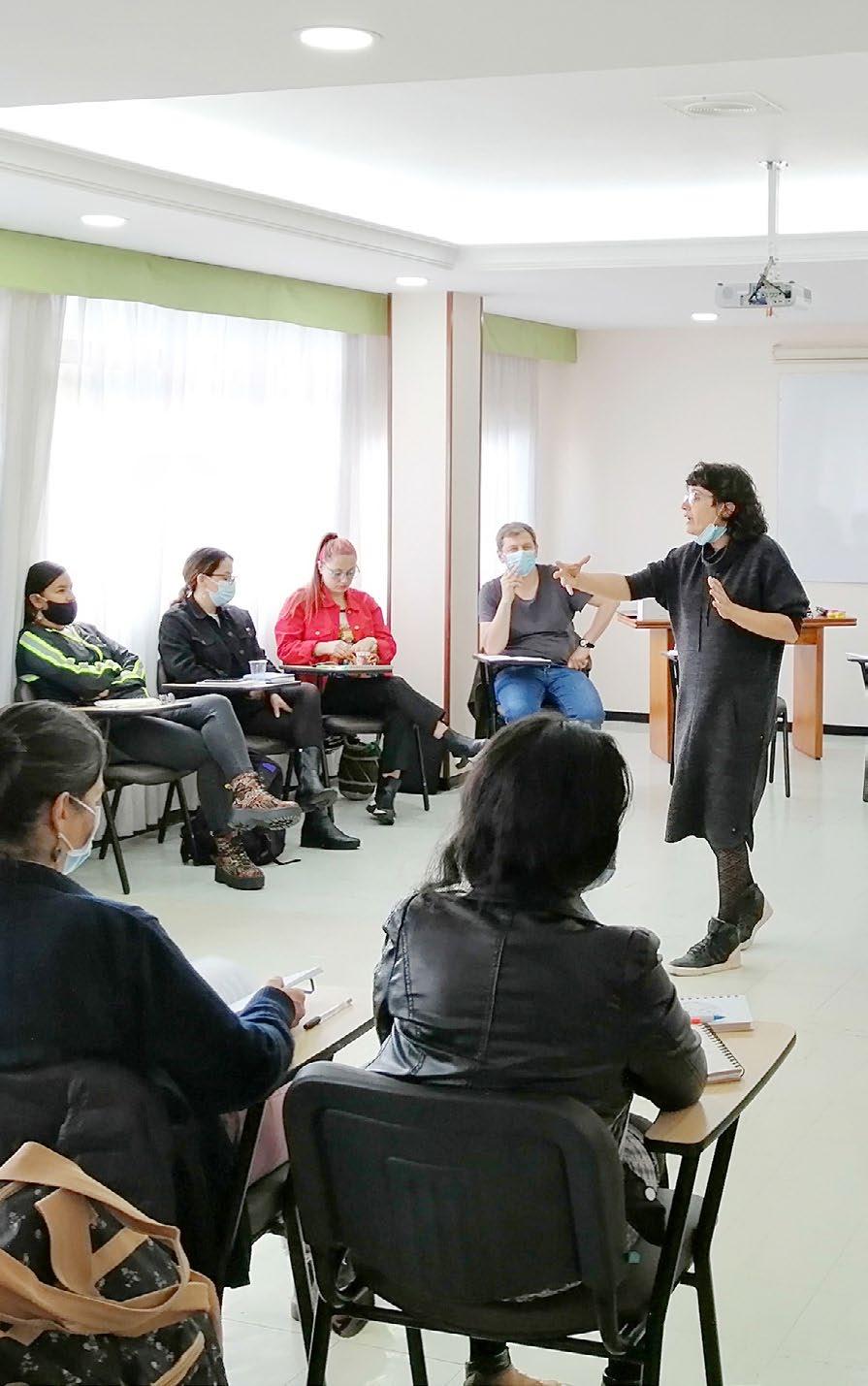
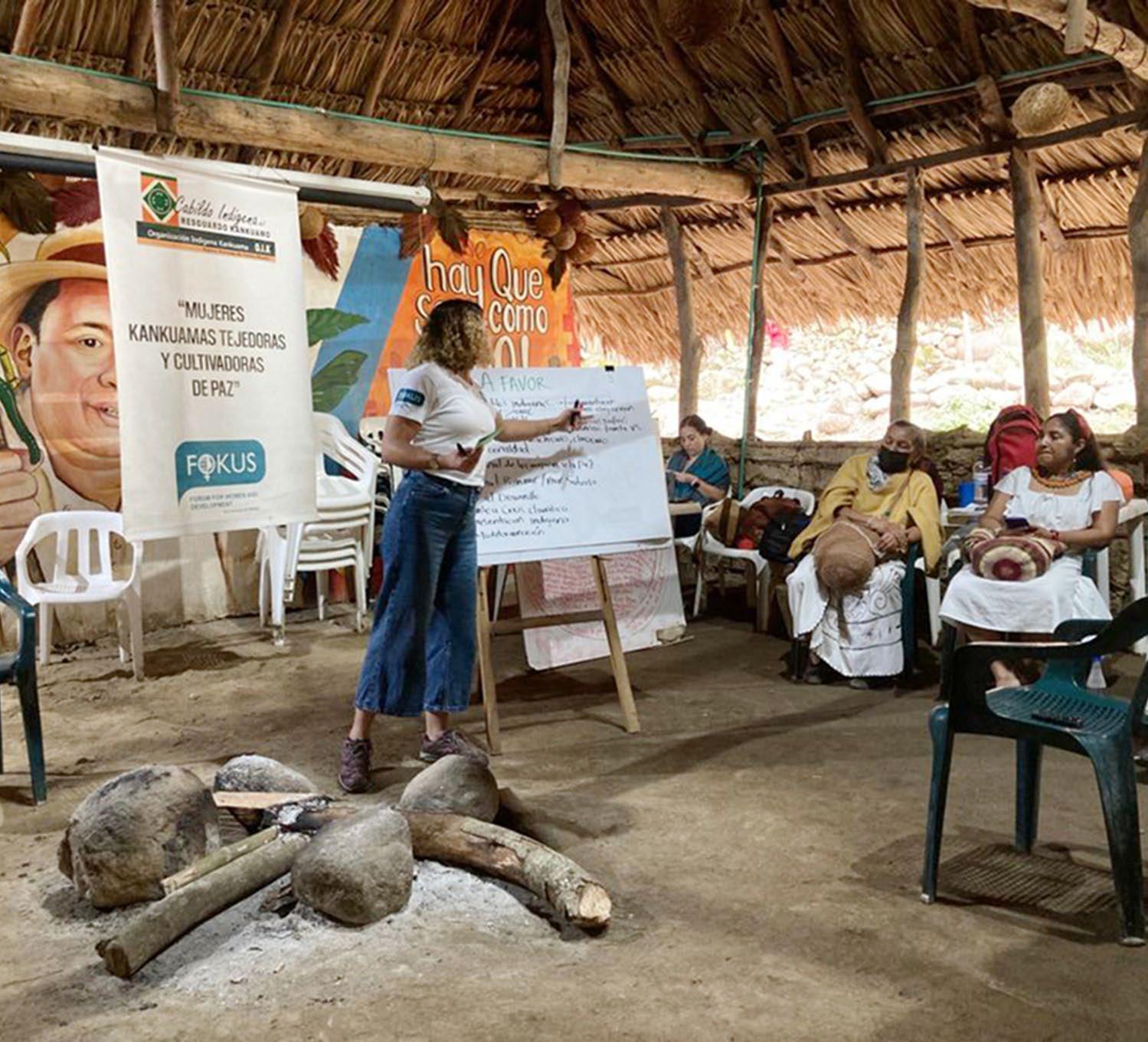
Rural women sustain the life and economy of Colombia. Land work along with care work fall on their shoulders but they are one of the least recognized groups in the country. For this reason, the primary challenge facing the incoming government is to begin to pay off this historical debt in the recognition of their rights, access to land, and their autonomy and independence.
On June 19, 2022, a new era was heralded, inau gurated by a popular and social justice-focused government seeking political change for the country. “Colombia, world power for life” is President Gustavo Petro and Vice Pres ident Francia Márquez’s main proposal but what implications does this have for rural women? Here we present some takeaways and reflections stemming from Corporación Jurídica Yira Castro’s perspective and experience.
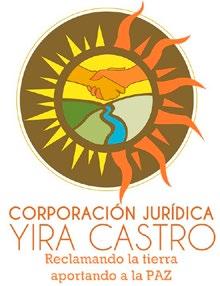
Despite women making up more than half of Colombia’s population (51.2%), they experience structural inequality with men owing to their gender. This gap widens for women who also suffer conditions of vulnerability, as in the case of victims of the armed conflict who represent half of the nearly ten million victims of the conflict (DANE, 2020, p. 8). Likewise, a woman’s place of origin, be it rural or urban, also produces a differentiated impact on her daily life. “Large differences in poverty levels are present between urban and rural areas,
with poverty rates between 2010 and 2017 at least 50% higher in rural areas than in urban ones,” (CJYC et al., 2019, p. 9). According to DANE, the gap in the Global Participation Rate between urban (56.7%) and rural women (39.1%) is nearly 18 points (DANE, 2020, p. 9).
According to the scenario described above, rural women experience higher levels of inequality compared with the national average for women. This has
rights to a violence-free life, to make choices about their own bodies, and to realize a prosperous and autonomous life project. They have assured the country that institutions and political programs will be guided by an intersec tional gender-based perspective that recognizes women of all ethnicities, cultures, sexual and gender orienta tions, ages, and incomes.
differentiated implications that must be addressed by the current govern ment to close the gender gap with men and women who live in urban areas.
The current government has promised changes for women in the areas of po litical representation, equality with and economic autonomy from men, and the
At the level of representation and participation, the administration has pledged that women will hold at least 50% of all public offices at all levels and in each branch of the government. Fulfilling this pledge would represent an important step but to what extent would the women elected to public of fice have the power to make decisions regarding the public agenda for rural women and the cross-sectionality of the gender-based approach in government programs? It does no one any good to recognize the political participation of women if they do not have the power to make decisions that advance their rights. This is one of the challenges the current government must address.
Rural women experience greater inequality than the national average.
First meeting of the Mujeres Víctimas Agropecuarias y Ecoturísticas de Puerto Lleras (Muevaep) in Puerto Lleras, Meta.
Land distribution of and women’s equal access to land comprise another central point that this administration will have to address, along with comprehensive rural development. Despite the fact that according to the National Agrarian Cen sus (ENA for its initials in Spanish) in the second semester of 2019, 89.1% of women producers ensured that their Agricultural Production Unit (UPA for its initials in Spanish) was their own, only women with UPAs of less than three hectares have the power to make decisions; in the case of women whose UPAs are greater than that, decisions are made by men (Dane, 2021, p. 14). This inequality in decision-making is propor tional to the low levels of technical sup port the government provides women compared to men (Ministry of Agricul ture and Rural Development, s. f., p. 47). As long as the knowledge and power to make decisions continue to reside in the minds of men, the equality gap will con tinue to exist for rural women. For this reason, the primary challenge facing this government is to fulfill its promise to ensure women prioritized access to the distribution and legalization of land ownership, free and public higher edu cation, and credit lines.
Owing in part to the accompaniment CJYC has provided long-standing orga nizations of rural women at the national level, a decree was finally issued in 2021 regulating the Rural Women’s Develop ment Fund (Fommur, for its initials in Spanish). This Fund, created via Law 731 of 2002, had, in practice, not been imple mented for more than 20 years, to the point that it turned into a focus of ongo ing struggle for rural women determined to revive it. This achievement, the decree regulating the Fund, was possible thanks to the efforts of rural women who now can participate directly in the Directive Council, owing to the Resolution 000156 of 2022 of the Ministry of Agriculture.
And so the new government’s prima ry challenge will be to launch a policy
program that recognizes all women in all contexts, with an eye toward repay ing the historical debt it has with them—and with rural women in particu lar—through its differ ent institutions, such as the Ministry of Equality (which has promised to unify all its policies to em power women) as well as through each dialogue space. FM
References
Corporación Jurídica Yira Castro et al. (2019). Primer Informe Sombra, específico de mujeres rurales y camp esinas en Colombia. https://bit.ly/3BaK9Ie

Dane (2020). Mujeres y hombres: brecha de género en Colombia. https://bit.ly/3cKpfpi
Dane (2021). Situación de las mujeres rurales en Colom bia. https://bit.ly/3RYpYTK
Ministerio de Agricultura y Desarrollo Rural (s. f.). Situ ación de las mujeres rurales en Colombia 2010-2018 https://bit.ly/3b2mZt0 https://www.youtube.com/watch?v=ekpPrPPrTco
Infografía Amazing
Land distribution of and women’s equal access to land comprise another central point that this administration will have to address, along with comprehensive rural development.
Ruling C-055 of 2022 represents a win for the right to voluntary termination of pregnancy (VTP) and positions Colombia in the global vanguard in recognizing women’s autonomy, freedom, and self-determination.


n February 21, 2022 the country learned of the Constitutional Court ruling that expanded abortion rights, allow ing women and gestat ing persons to terminate a pregnancy through week twenty-four, according to their own reasons and without the threat of imprisonment. For preg nant peoples seeking to terminate a
pregnancy after this period, this rul ing preserved the three grounds for
VTP previously established by Rul ing C-355 of 2006: i) when the preg nancy represents a risk to the health or life of the woman; ii) when the fetus presents a malformation that makes life outside the womb inviable; and iii) when the pregnancy is the result of sexual violence or incest.
Guaranteeing compliance with Ruling C-055 of 2022 and creating a comprehensive public policy will be tasks of the current government.TEXT AND PHOTO: MESA POR LA VIDA Y LA SALUD DE LAS MUJERES
This legal decision gave rise to the Just Cause Ruling (C-055) which ex horts Congress and the national gov ernment to formulate and implement a comprehensive political policy as soon as possible to prevent violations of the rights and dignity of women and ges tating persons.
Without a doubt, this achievement by the Just Cause movement represents a win for VTP rights and positions Co lombia in the global vanguard in rec ognizing the autonomy, freedom, and self-determination of women, with the partial elimination of the crime of abortion from the Penal Code. It will therefore be the current government’s responsibility to defend and protect it.
Two of the greatest challenges for the current administration’s first year will be to guarantee comprehensive compliance with this ruling and for mulate a public policy that at least includes clear disclosure of the op tions available to a gestating woman before and after her pregnancy, and the existence of ways to prevent preg nancy, including birth control. The policy must also include the develop ment of sexual and reproductive ed ucation programs and demand paths to healthcare access and mandatory protocols for the General System of Social Security in Healthcare to en sure timely abortion access.
It will likewise be necessary to halt any action taken by anti-rights groups aiming to contradict or nullify what the High Court has recognized. For exam ple, two initiatives have been identified which aim to modify the Political Con stitution via referendum so that abor tion is once again outlawed and the Constitutional Court’s rulings are nul
lified. This would mean a total setback in human rights in that it entails not recognizing that women are subjects of law, fully capable of making decisions about their bodies and life projects.
Eliminating obstacles to VTP access which hinder women’s full enjoyment of their rights will also be a fundamen tal task in the coming years. According to assessments of the first 100 days following the historic ruling, made by
support of social and cultural trans formations that legitimize their full realization; yet when it comes to abortion, social decriminalization advances at a slower pace and faces considerable challenges. According to the analysis of several public percep tion surveys carried out by the agency Cifras y Conceptos, between 2017 and 2021 the percentage of individuals who reject the idea that women who have abortions should be incarcer ated has increased con siderably. In 2021, 49% of the population was against imprisonment while those who were indifferent to the issue made up 18% (the latter representing a decrease since 2017, when the percentage was 26%.)
La Mesa por la Vida y la Salud de las Mujeres and Fundación Oriéntame, be tween February 22 and May 31, 2022 there was a 52% increase in cases reg istered by La Mesa compared to the previous year. The number of women seeking to access VTP is expected to continue to rise.
For this reason, addressing obstacles associated with ignorance of the cur rent legal framework as well as restric tive interpretations of the law which affect the provision of this healthcare service will be fundamental to advanc ing guarantees for this right, especially in migrant women who must receive timely, respectful, quality, and dignified abortion services, regardless of their migratory status.
Legal advances in the protection and guarantee of rights require the
These results are co herent with a society that is more in favor of actions or policies focused on information and the prevention and promotion the issues of sexual and reproductive rights, rather than one that supports the use of penal law to criminalize women.
It is, nevertheless, still necessary to create conditions that legitimize women’s decisions regarding abortion and eliminate the stigma and preju dice around the issue. From there is it imperative to provide clear and cor rect information to combat false be liefs and enable progress in building a country that fully recognizes women’s freedom and autonomy.
Movimiento
Balance
La
FM
The first 100 days following the ruling saw a 52% increase in cases registered by La Mesa compared with the same period last year.
Taken from: https:// www.latimes. com/espanol/ internacional/ articulo/2022-06-20/ francia-marquezla-primeravicepresidenta-afrode-colombia
In this article, we explore the change from Duque’s government to Petro’s and present three key challenges to advancing peace with women and LGBTQ individuals in this new scenario.

TEXT: COLOMBIA DIVERSA

Following a heated elec toral contest, the Gus tavo Petro and Francia Márquez ticket was elected to the offices of President and Vice President for the period 2022 through
2026. The results of these elections mark a significant change from the outgoing government of Iván Duque. During his administration, Duque showed clear disdain for issues relating to gender and peace. This translated to a slow down in the implementation of
the gender-based measures contained in the Final Accord since mid-2018, as has been reported by the Grupo del Género y la Paz (2021).
The lack of political will on the part of Duque’s administration has wors ened the conflict in some territories, affecting the safety of lesbian, bisexu al, and trans leaders and human rights defenders. In spite of this, Colombia Diversa has managed to consolidate alliances with women’s organizations and position the demands of LGBT individuals before the Comprehensive System of Truth, Justice, Reparations, and No-Repetition (SIVJRNR for its initials in Spanish), thereby improving conditions for the participation, lead ership, and advocacy of LBT women in peacebuilding spaces.
We have identified three major chal lenges this new government faces to building an inclusive peace. The first is its ability to capitalize on the op portunity represented by the election of a progressive government which, at least formally, includes women’s and LGBT issues and peace in its discourse and agenda. This change, compared with Duque’s administra tion, is key to resuming the imple mentation of the Final Peace Accord (FPA) and increasing security efforts so that LBT women can actively par ticipate in peacebuilding in their ter ritories. The plan outlined by Petro’s administration situates peace as a transversal issue, including it in the chapter focused on women as well as the one dedicated to peace; peace is also referenced in a few specific pledges for LGBTIQ+ individuals. Likewise, it proposes an intersec tional approach that recognizes the ethnic, cultural, sexual, gender, life
cycle, and income-level diversity of women; yet it is not yet clear how this administration plans to ensure the in clusion of a gender-based approach in the FPA’s implementation nor which methods and indicators will be used to monitor measures for LGBT indi viduals. This is a political opportunity to strengthen civil society monitoring of implementation of the FPA.
The second challenge is to ensure that Vice President Francia Márquez’s role is not merely symbolic. In Colombia, the office of Vice President has historical ly not represented a political role with sufficient influence to make decisions
administration truly incorporates what the Vice President has to offer.
The third challenge is to safeguard ad vances in the recognition and protec tion of the rights of LGBTQ persons against possible rollbacks. While the new government has claimed to be progressive and inclusive, it has been willing to form alliances that may put the rights won for LGBTQ individuals at risk. For example, during his cam paign, Petro formed alliances with sev eral evangelical sectors and traditional parties such as the Conservative Party to ensure greater governing power. Additionally, although women occu py an important place in his government plan, this inclu sion has primarily been given through a binary perspective of cisgender, heterosexual women. For this reason, it is more likely that in the event he must make concessions, Petro will use the interests of LGBT persons, rather than cis-heterosexual women, as a bargaining chip.
within the administration. In this case, however, Márquez—who obtained a considerable number of votes in the Pacto Histórico primary and represents historically marginalized sectors of so ciety—mobilized votes with the hope for a change toward a better life (Vivir sabroso, or Living with Flavor) for the majority based on gender, territorial, and ethnic-cultural reasoning. This is moment to talk about the needs of women and LGBTQ individuals with an intersectional perspective, yet there exists a latent risk that the Vice Pres ident—both as figure and what she represents—will be instrumentalized, which is why it is important to exert pressure on the president so that his
Consideration for these challenges is key to adapting our advocacy strate gies, since beyond this current admin istration, the work carried out by civil society organizations is essential for building a more just and inclusive so ciety and for the transformation of the lived realities of women and LGBTQ persons into ones that enable the con solidation of peace. FM
Reference
Grupo de Género en la Paz (GPAZ) (2021). La paz avanza con las mujeres. III Informe de observaciones sobre los avances en la implementación del enfoque de género del Acuerdo de Paz. GPAZ. https://generoypaz.co/informes/ gpaz_informe_2021.pdf
Beyond the current administration, civil society is key to building a more just, inclusive, and peaceful society.
The Great Woven Hemp Bag initiative (Mochilón de Cabuya de Fique) gathers together all the elements necessary to harmonize life, a proposal that aligns with the political moment the Colombian nation is currently experiencing following the election of Gustavo Petro.
At a moment when a sig nificant group of indig enous women from the Sierra Nevada drives the Great Woven Hemp Bag initiative—which emphasizes ancestral knowledge and practices as tools for the indigenous peoples of Gonawindua to reconcile the acts of violence committed against them (especially women)—Gustavo Francisco Petro Urrego arrives at the highest office in the Colombian na tion with the prerogatives contained in his proposal to govern “Colombia, world power for life” to rule the des tiny of the Colombian nation for the 2022-2026 period.
This proposal aims to generate a new social contract with the regions, where “the diversity of the nation [resides], in order to finally enter an era of peace whose face is a multiracial democracy, expression of the mandates of its citi zens, that achieves equality and makes a productive economy that generates
wealth based on work and protecting the house we occupy in common a re ality.” This mandate coincides with the commitment to peace that the indig enous peoples, led by Wiwa, Arhuaca, and Kankuama women, offer the coun try based on their cosmogony regarding how to care for life. It is in accord with such prevailing issues as the response to climate change, peacebuilding in the territories, and the recovery and pro tection of life, based on the model of Good Living.
From there, possibilities emerge to position the Great Woven Hemp Bag and use it to engage in advocacy to confront the problems currently fac ing humanity, making it highly relevant for the actions taken to protect Mother Earth that go beyond a instrumental izing vision of nature to locate her in a sacred relationship of which we are only a part, ratifying the millennial role of the indigenous peoples of the Sierra Nevada to whom her safeguarding has been entrusted.
TEXT: KANKUAMO RESERVATION
INDIGENOUS COUNCIL
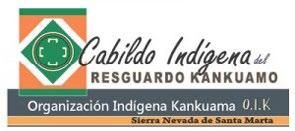
The inclusive creation of the new government’s National Development Plan enables the territories—which are pluricultural and multisector—to achieve greater relevance, with which comes the participation of indigenous women following the first Binding Re gional Dialogue which took place in Santa Marta on July 27th. This event was the setting for several of these women to come together with their local authorities and present each of the proposals they have developed over the past several years, includ ing: their leading role in the healing and reestablishment of equilibrium in response to all forms of terrorism, based on overcoming the paradigm of violence and destruction of life as a part and parcel of victory and current development models which clearly de stroy Mother Earth, and validating the importance of opening intercultural dialogues to address disagreements.
This requires overcoming historical and structural cycles of violence that
directly affect women in their Ter ritories-Bodies-Memory and their influence as transformers of individ ual, family, and collective life projects; women who also call for interjuris dictional coordination with ordinary justice and transitional justice to generate proposals through the tra ditional way of living that indigenous peoples have called Good Living.
Indigenous women play a fundamen tal role in all aspects of this process, a task which is linked to their intimate relationship with Mother Earth and the Law of Origin since within them lie the physical and spiritual materi als that society needs to advance in its process of harmonization and heal ing, based on the fundamental under standing that these women are living memory, translated and recognized as peacebuilders since Resolution 1325 of the year 2000.
Throughout the national territory, the role of the indigenous women of Colom bia stands out in the generation of these transformations of thought, which were key to the election of the new president currently residing in Nariño Palace. Ad ditionally, June 18, 2022 was a historic day for the nation when Arhuaco indig enous leader Leonor Zalabata anointed the President Elect as “President of the Heart of the World,” a designation that has very important spiritual connota
tions for the four indigenous peoples that live on in the mountainous massif.
Coupled with the above, the proposal of Petro Urrego’s government is centered on a model co-governance, a valuable tool to naturally be positioned within the 2022-2026 Development Plan with the support of the indigenous women of the Sierra Nevada of Gonawindua who must take on the position of spokeswomen in different spaces in order to position their needs and those of all Colombian women and all Colombians in general.

Tomado de https://gustavopetro.co/programa-de-go bierno/temas/
Experiences exchange on access to justice for indigenous women and families. Place: Pueblo Bello, May 30-31, 2022“Colombia, World Power for Life” is aligned with the peace proposal that indigenous peoples, led by Wiwa, Arhuaca, and Kankuama women, offer the country.”
Gustavo Petro faces numerous challenges; of these, there are three related to peacebuilding we want to focus on: recovery, understanding, and contribution.
Colombia
TEXT AND PHOTO: CORPORACIÓN HUMANAS
by Iván Duque through his lack of po litical will and his focus on “Peace with Legality,” characterized by increased militarization of the territories, autho rizing fumigations of crops considered illicit, and the misappropriation of funds earmarked for territorial peace.

not a single hectare has been given to women, to name one example.
Generally speaking, the institutional architecture has already been created to implement many of the FPA’s mea sures, something which eases the path of implementation, as it does not re quire major legal transformations; it is about recovering the spirit of peace.
The Final Peace Accord (FPA) was a historic landmark for a country tired of war. Despite setbacks, the length of negotiations, the “No” response in the referendum, and the ill-intentioned campaigns of a right entranced by, or benefiting from, war, an accord was achieved that proposes a path to building peace in Colombia and includes more than 100 gender-based measures for women and LGBTIQ+ persons in its six chapters.
Recovering the FPA is the passport for the new administration to mend the tears in the peacebuilding process made
The FPA must be recovered, its imple mentation corrected, and measures aimed at the historically excluded
Reactivating peace through the work of women is urgently necessary, not as an additional aspect of the pro cess but as a primary, driv ing strategy to achieve it. The gender-based measures have not advanced owing to a lack of political will.
peripheries of this country must be accelerated; among the administra tion’s priorities must be land, food, ed ucation, and labor rights for the rural population. Above all, the gender-based measures must be implemented since
Women’s and feminist or ganizations have demanded and sustained peace when, in times of war and armed conflict, the government’s response has been a military one, with an abuse of force. Feminists are promoting a dynam ic Women, Peace, and Security Agenda that considers the pressing issues of today: migration and exile; the impact
The Final Peace Accord (FPA) must be recovered and the measures addressing the historically excluded peripheries of this country must be accelerated.
of COVID-19; social protest; protecting human rights and environmental defend ers; and drug trafficking. All these issues must be read and addressed from a per spective of feminist, humane security.
Understanding the Women, Peace, and Security Agenda, especially United Na tions Security Council Resolution 1325 of 2000, in order to include it the ad ministration’s agenda, is not only a goal but an act of democracy and gender jus tice. It is vital to generate dialogues with women’s and feminists organizations throughout the country to advance to ward the first National Resolution 1325 Action Plan for Colombia.

This is perhaps the most important goal of the new president. It is necessary to contribute new viewpoints to identify the
forms of war and the way they overlap; the variable character of its protagonists; and the perverse relations it has with the needs of the population and institu tional vacuums both in urban and rural areas. This reality requires creating from scratch alternative ways of negotiating and reactivating the peace process, as well as methodologies that enable prog ress on an agenda with the ELN, propose a conclusive but nonviolent exit strategy
for dissidents, and capitalize on the con cept of “multi-crime” that Petro intro duced during his campaign to face the hydra of drug trafficking.
The challenge of contributing to total peace in Colombia requires innovation, intelligence, and magnanimity on the part of the new government. The peace process in Havana left issues out of the FPA that must be addressed if we wish to turn the country into a world power for life and contribute to the sustainability of a total peace: the right to water, food sovereignty, climate change, renewable energy, political equality, and the fight against institutional racism and classism.
This administration’s first 100 days will have to consider actions to recover the FPA, understand the Women, Peace, and Security Agenda, and contribute to total peace. FM
The challenge of contributing to total peace in Colombia requires innovation, intelligence, and magnanimity on the part of the new administration.
Women are conscious of the fact that peace can only be built through work, compromise, and dialogue rooted in diverse wisdoms.

TEXT AND PHOTO: TEJIDO MUJER CXHAB WALA KIWE- ACIN / CORPORACIÓN DE APOYO A COMUNIDADES POPULARESCODACOP
The election marked a milestone that reaf firms and strengthens the work of indigenous Nasa women in North ern Cauca. Never be fore have the women who make up the Tejido Mujer project of the Çxhab Wala Kiwe—whom we at Codacop have accompanied—felt themselves to be so active in the political arena. This project, which promotes and de fends human rights and supports the defense of territories, also enjoys the support of FOKUS through a project that was implemented in 22 indige nous territories in 8 municipalities in the department of Cauca.
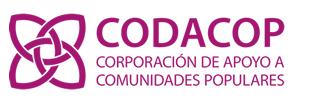
Feelings of joy and hope fuel Nasa women right now, as they likewise fuel those of us who form the Codacop team and learn from them the tireless and dedicated work of defending Uma Kiwe , Mother Earth. These women, whose stories have played a leading role in building the strength to resist the advance of a political and eco nomic project whose militarization has impacted their lives and bodies as well as the livelihood of their com munities, today feel they are standing before the doors of a historical mo ment for the country, for women, for indigenous peoples, for the impover ished, discriminated, and excluded; for those racialized, marginalized, exploited, victimized bodies and for all beings included in that group the Vice President called “The Nobodies.”
Such excitement is no small thing, given that the achievement of the Historic Pact—which carried Gus tavo Petro to the presidency and was a very important election for the fight and dreams of social movements and those who support change in the coun try—would not been the same without Francia Márquez Mina’s presence. She is a woman who, through her personal history, represents the impact of dis crimination and violence, as a Black, rural woman who is the head of her family, an environmental defender, and resident of a territory in dispute by armed groups.
Along with Francia and her philosophy of Living with Flavor, which is synony mous with living with dignity, tranquil ity, and without fear, Nasa women feel that it is possible to envision the real ization of wët wët fxizenxi, living well, as a collective project of the people, of indigenous women and men. The hope
this represents is also is strengthened with the election of the first indigenous senator, Nasa leader Ayda Quilcué, and the presence of other indigenous and Afro leaders in other public positions.
The happiness and hope which char acterize this moment is proportional to the enormous effort that has been made since the event called “The Wind of the South: The Minga for Change.” This was a tour through the southwestern region of the country to encourage responsible, sensible
been complicit in barbarity, injustice, inequality, plunder, and war, and that all political exercises and governance must be driven by new feelings, voices, visions, and approaches.
The challenges are enormous, the con cerns are many, and the commitment to the work continues intact. They will be closely monitored, with support, contribution, proposals, and oversight. For this reason, Codacop and the Nasa women propose an active and positive accompaniment over the coming years of this government of peace, hope, and women. We aim to contribute to this process in a concrete way by strengthening the voices of women and sup porting leaders and dialogues in favor of territorial peace building: a peace without arms or armed groups in which ev eryone fully enjoys a life of dig nity and the joy of residing in territories that are safe.
voting that is consistent with a his torical memory that demanded polit ical change, using the word to involve more people in the project to make this new administration’s vision of the country a reality.
These women know well that as soon as the door is opened, a path must be made based on spirituality and the strength of the word, as the elders teach, in order to embark on new jour neys; a goal met is merely a step toward realizing the dream of building a better world, one that offers dignity and life for all people and beings residing in the national territory. They know and we know that the obstacles we encounter will be many, that ahead lies the great challenge of rebuilding a state that has
We aim to work hard to achieve the creation of a Resolution 1325 National Action Plan; collaborate to advance the implementation of the provi sions of the Comprehensive System for Justice, Truth, and Reparations; support the implementation of the Truth Commission’s legacy; advocate for the implementation of measures in favor of justice for women; and par ticipate in the exercise of protecting women rights defenders. Lastly, we commit ourselves to supporting the construction of a country at peace through our work.
FM
Reference Tejido Mujer ACIN, https://www.facebook.com/ tejidomujer
We aim to contribute to this process by strengthening the voices of women and developing leaders and dialogues in favor of building territorial peace.
Los Fogones de la Memoria (Hearths of Memory) is a collective memory and peacebuilding process led by Corporación Cartografía Sur, the Centro de Promoción y Cultura, the Centro de Memoria Paz y Reconciliación, and FOKUS in the neighborhoods of Santa Fe, Usme, and Kennedy in the city of Bogotá.
This process, which has revolved around memory and the cartogra phy of re-existence, has had been meaningful for those who believe that peace is built at the territorial and local level, and that Bogotá must also be a territory of peace.
“an opportunity to continue pushing for Bogotá to be recognized as a peace territory, bring attention to strategies for re-existence, and connecting or ganizational, institutional, and inter national processes.”

Installing a “Hearth of Memory,” which draws on the magic of fire and what the hearth space has meant for women and communities in re-exis tence, is a symbolic act with a highly political character.
Throughout 2021 and the first half of 2022, Centro de Promoción y Cultura, la Corpo ración Cartografía Sur, el Centro de Memoria Paz y Reconciliación, and FOKUS have collaborated on a project called Los Fogones de la Memoria (Hearths of Memory) in three neighborhoods in Bogotá: Santa Fe, Usme, and Kenne dy. This has been possible thanks to alliances with local organizations. In Santa Fe the project received support from la Asociación Mujeres y Madres Abriendo Caminos; in Usme from Cír culos de Paz; and in Kennedy from the Centro de Promoción y Cultura.
Collective analysis of this process has enabled us to identify how rele vant it has been for those involved in this work. Cartografía Sur describes it as “an opportunity to deepen our understanding of the organizational processes and work for resistance and re-existence that are present in each one of the territories.” For the Centro de Promoción y Cultura, “the exercise of building memory has allowed us to recognize ourselves as builders of territories and this is a contribution that we make to building peace in the city.” For CMPR, “measurements of peacebuilding in the city are made not only with direct victims of the conflict but also through women and their organizational processes,” while for FOKUS it has represented
The act of accompanying these hearths with Círculos de Paz, making storytell ing an exercise that connects communi ties and which is done not with women from outside the community but with young women who have made the word into a powerful and respectful tool that is both playful and political, in language that connects them with their peers, has been another demonstration of the power of language and of art as paths toward building memory and peace.
We also share the emotions that the counter map awoke in each commu nity; that printed artefact, fruit of collective labor, that, thanks to the il lustrator’s magic, managed to repre sent the way in which women and local organizations live, exist, and re-exist at the local level, which is reflected in comments such as these: Cartografía Sur emphasizes that “the act of seeing
themselves represented in a country where the representation of work ing class areas is not very common, generated an effect of recognition” that broke with the hegemonic logic of the property tax maps and shows the richness of maps created by the
people who reside in the territories depicted. For CPC, it means “mobiliz ing the people through a different strategy […] it means putting on the counter-map what has hegemonically not ex isted there before.” For CMPR, “these maps are magic, they are a-geo graphic and atemporal.”
For FOKUS, “the count er-map is a pedagogical proposal that is does not subscribe to hegemonic pedagogies.”
This exercise, carried out in the con text of a new administration that is supporting Total Peace, is another
example of how women’s organiza tions and neighborhood processes are building memory and peace pro cesses that must be recognized and strengthened, not co-opted.
We will continue to strengthen ter ritorial peace through alliances and collaboration with other organiza tions, working with women’s organi zations that are building memory and peace, confident that the hearth and the counter-map are powerful exer cises that connect us to the warmth of fire, of the collective, and of the beau ty of illustrating—and representing ourselves—with a broad palette of colors that reflect the diversity of the neighborhood and the way the com munity sees itself. FM

The Hearths of Memory are “an opportunity to deepen our understanding of the organizational processes and work for resistance and re-existence that are present in each one of the territories.” Cartografía SurCover: Presentation of the Hearth of Memory and the Counter Map to the locality of Usme, Bogotá.
María de Jesús Cárdenas Sandoval, Centro de Promoción y Cultura CPC. Presentation of the Hearth of Memory and the Counter Map to the locality of Santa Fe, Bogotá, 2022.
